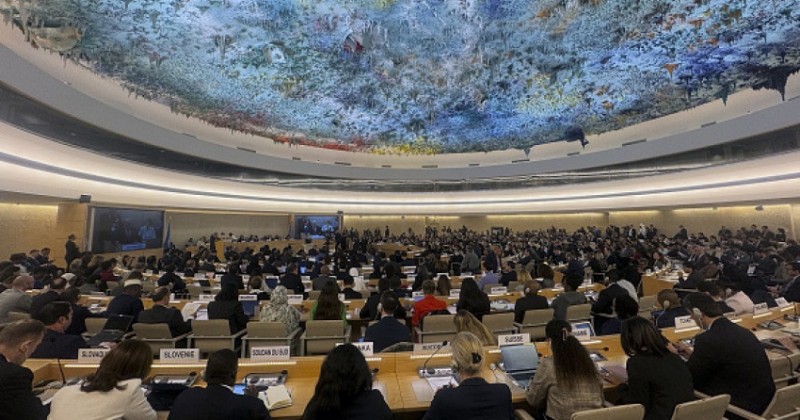
The United Nations Human Rights Council is poised to discuss a resolution proposing an arms embargo on Israel due to concerns about the risk of genocide in Gaza. This marks the first time the council has addressed the ongoing conflict in Gaza.
The resolution, put forth by Pakistan on behalf of 55 out of 56 member states in the Organisation of Islamic Cooperation (OIC), condemns Israel's use of explosive weapons in densely populated areas of Gaza. It calls on Israel to prevent genocide and end its occupation of Palestinian territory, as well as lift the blockade on the Gaza Strip.
Co-sponsored by Bolivia, Cuba, and the Palestinian mission in Geneva, the draft also urges countries to halt the sale or transfer of arms to Israel. It condemns the use of starvation as a method of warfare and calls for an immediate ceasefire, criticizing actions that may constitute ethnic cleansing.
In a separate resolution, the council calls for adequate funding for UNRWA, the UN agency for Palestinian refugees, and demands Israel halt the expansion of settlements in Palestinian territories. It emphasizes that criticism of Israeli violations of international law should not be equated with anti-Semitism.
Additionally, the resolution condemns rocket attacks on Israeli civilians and calls for the release of hostages and detainees. The council will deliberate on whether to adopt these resolutions, along with others concerning Israeli settlements, Palestinian self-determination, and human rights in the occupied Syrian Golan.
Israel has previously accused the Human Rights Council of bias against it. The conflict in Gaza, which began with an attack by Hamas on October 7, has resulted in significant casualties on both sides. According to Israeli official figures, approximately 1,160 Israelis, mostly civilians, have died, while Palestinian militants have seized around 250 hostages. Israel's retaliatory campaign has reportedly claimed the lives of at least 32,975 people, primarily women and children, according to Gaza's health ministry.
However, it's important to note that casualty figures and other details may vary depending on different sources and perspectives.
The resolution's consideration comes after a recent UN Security Council resolution calling for a ceasefire, which was facilitated by a rare abstention from the United States, Israel's key ally.
The proposed measures are expected to spark intense debate within the UN Human Rights Council, with Israel likely to contest the resolutions vigorously.
Critics argue that the proposed embargo and other measures unfairly target Israel and could hinder its ability to defend itself against security threats. Proponents, on the other hand, argue that such actions are necessary to address human rights violations and bring about a peaceful resolution to the conflict.
The outcome of the council's deliberations remains uncertain, but the discussions underscore the ongoing international concern over the situation in Gaza and the broader Israeli-Palestinian conflict.
Aerial Attack Hits Israeli City of Eilat; Militia Claims Responsibility, Details Here
Al-Shifa Hospital.Gaza Left Devastated After Israeli Withdrawal, See in Pics
White House Holds Talks with Israel on Gaza Offensive Concerns
Hamas Rejects Ceasefire Proposal, Accuses Israel of Ignoring Demands